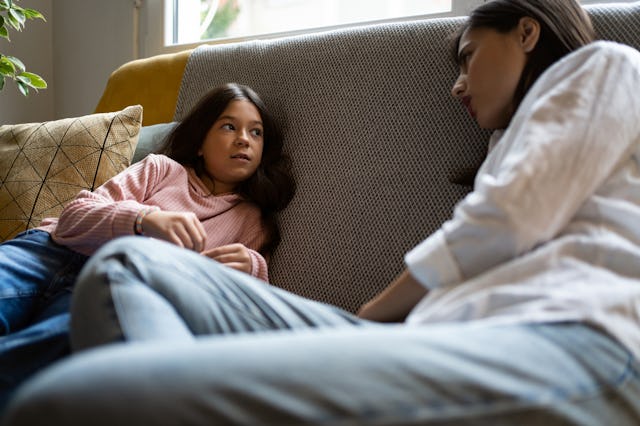I Overheard My Tween Having An Orgasm. Do I Talk To Them About It?
A sexual psychophysiologist helps take the topic from taboo to totally NBD.

There are many parenting scenarios that feel impossible to prepare for — including, near the top of the list, hearing your child having an orgasm or having them hear yours. Eek! Among the many sex and masturbation talks you'll have with your kids, it can be particularly awkward to discuss orgasms, especially since the topic tends to be fraught for many women. (And understandably so!)
But if you want to raise your kids with a healthy, sex-positive self-image, talking about pleasure is important. So, how can you do it without overwhelming or embarrassing your kiddo? A sexpert is here to help you sort it all out.
The Question of Age
There's no specific age or developmental milestone when your child might experience an orgasm, as sexual psychophysiologist Nicole Prause, Ph.D., tells Scary Mommy. "It is not clearly precise when 'orgasm' develops in youth for many reasons. First, ejaculation and orgasm are separate processes and likely do not develop perfectly together, so the mere presence of ejaculate is not sufficient to determine whether a male has had an orgasm."
And for kids of all genders, there is limited data on an exact age range — children cannot consent to discussing the topic for research purposes, and adults might not accurately recall their first orgasms, making it complex to pin down a concrete answer, says Prause.
"Adult recall of the orgasm experience suggests it may occur around age 13 in male youth, and 'somewhat later' and highly variable in female youth," she says, noting that "in the late 1990s, just 5 of 15 sex education books in the UK for 14-16 years olds mentioned female orgasm, while 15 mentioned male ejaculation but did not differentiate ejaculation from orgasm." In other words, female and nonbinary sexuality has been woefully under-researched and understudied for decades. Surprise, surprise.
Honesty Is the Best Policy
OK, so what do you do if your kid asks you about orgasms or if you overhear it happening from a different part of the house? Prause explains that it's better to discuss it with them openly and in an age-appropriate way that they can understand, as opposed to whatever wild half-truths they might hear from their friends and other kids at school or on social media.
"Youth may overhear many sexual terms that they are not developmentally prepared to understand, orgasm being one," she says. "Generally, telling a kid 'you're too young' risks them seeking the information from unreliable sources like same-age peers."
It’s OK to Withhold a Little
That said, "it is not sex-negative or sex-shaming to decline details as appropriate to their age. For orgasm, parents can ask about where they heard the term to make sure it was not from an inappropriate source that needs to be addressed; then they can provide a general explanation like, 'Orgasms feel good and are usually something that older people experience.' This provides as much detail as youth may comprehend or need."
No matter the context, you should reiterate that your child can come to you with any questions or concerns they might have, and you should ensure that you're approaching the topic with understanding, curiosity, and zero shame or stigma. Having an adult they can trust with these discussions is crucial and will surely help shape their earliest experiences to be safe and positive.
This article was originally published on